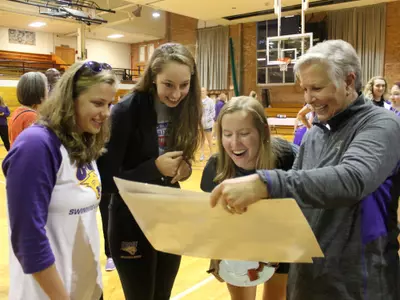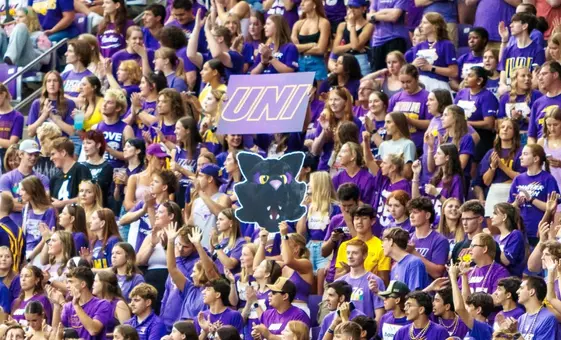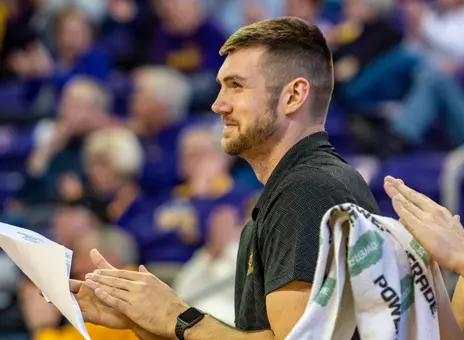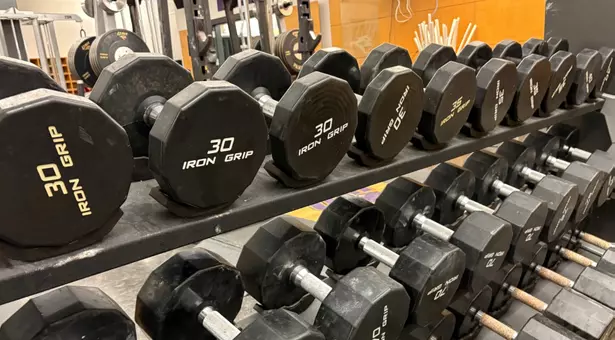University of Northern Iowa Athletics

Panel Celebrates Anniversary of 1st Women's Practice
9/13/2018 8:54:00 AM | General
CEDAR FALLS, Iowa – Fifty years after Dr. Elinor Crawford blew her whistle to begin the first practice of the UNI Intercollegiate Women's Athletics Program, nearly 200 female student-athletes gathered to learn from pioneers of that era.
(9/12/2018) UNI 50 Years of Women's Athletics
UNI's female student-athletes kicked off a year-long celebration on the very same day Panther women were allowed to form and compete in field hockey, which started practice Sept. 10, 1968.
A group of seven women returned to UNI to with stories of struggle and inequality and also of friendships and triumphs.
"There's a lot that has happened before you came to UNI that set the stage and set the foundation to give you an opportunity," David Harris, UNI's director of athletics, told UNI's female student-athletes. "For us being grateful starts with these ladies and many others who couldn't be here. They gave you an opportunity to not only get an education but play a sport that you love and have an experience that you will carry with you for the rest of your lives. So we are tremendously indebted to them and everyone like them who has come forth to give you a chance."
Crawford coached at UNI from 1968-1972, but her first Panthers were not allowed to wear the UNI logo on their uniforms. The young Panthers got a first-hand look at an original field hockey uniform.
"One thing you will notice about these garments, there's no UNI insignia of any sort," said Mandi Anderson, who was on the first field hockey team. "None."
When the women's basketball team was finally given uniforms in 1974, the team was forced to share, said Wanda Green, who coached the basketball and field hockey teams. Volleyball and softball also used women's basketball uniforms for the next couple of years.
Home field advantage was not much of a thing when UNI didn't have a home field to call its own. The softball team bounced around from complexes in the city, often dealing with rough field conditions.
It was Nancy Justis who fought for media attention for UNI's women's teams. Justis was UNI's first full-time assistant sports information director and later took over the department in 1979.
"In the early years, it wasn't just the university who wasn't covering the women; it was the media who wasn't covering women," Justis said. "It took a lot of years to get the newspapers convinced that they should run results of women's sports and write features on the female athletes. That was a constant battle."
Jane Mertesdorf coached UNI's softball team from 1972-78 at a time when society didn't look favorably on women participating in athletics.
"You grew up in an environment where competition was beneficial to you … and with the support of your community," Anderson told the student-athletes. "Basketball was the only sport offered in my high school. In our conference of eight schools, only four teams allowed girls to compete."
Anderson said her classmates were successful at a competitive level, but they were shocked when they arrived at UNI and discovered the university was opposed to women's competition.
"Then we get here to UNI, and we're told 'Girls don't compete,'" she said. "'This is not appropriate.'"
Female student-athletes had to settle for joining intramurals at UNI, but their competitive spirit got them banned from doing what they loved, according to Anderson. A group of women who were recruited to play an exhibition game against another college team were cut off from intramurals for their actions.
Anderson said the wellness center wouldn't even check out equipment to the women to play on their own. While many young women were fighting society for the right to compete, Clare McGee Struck's father was trying to expose his daughter to every sport he could.
She immediately fell in love with baseball but was denied access to leagues as a young girl. Tennis was the acceptable option for Struck, but she viewed it as a sissy sport. Luckily for UNI, she fell in love with the game and was among the first women to compete for UNI.
"I don't know a lot about the ins and outs of Title IX, but I look out at all you student-athletes and coaches, and you are testimony to the progress that we've made," Struck told the UNI student-athletes. "It's exciting to see the level of play – how it has risen."
Upon the implementation of Title IX in 1972, the landscape changed for women in athletics.
"It was like a starting gate was opened for women's athletics," said Mertesdorf. "Everything just took off."
Title IX was designed to protect people from discrimination based on sex. It was created with the intention of providing individuals equal access to participation and benefits under educational programs receiving federal financial assistance.
Lori Kluber played field hockey, basketball and softball at UNI. She was on a committee charged with researching what Title IX meant. She said she will never forget one fact.
"The total women's athletic budget – all the sports' athletic budget back then – was less than the men's football tape budget," she said. "So that lets you know how far we had to go and how far we have come. And look at your facilities. Amazing. You're so lucky, but keep the fight going."
Despite all the challenges that came with competing as a female student-athlete, Kluber had a lot of fond memories.
"Teams feared UNI. We were absolutely incredible," she said. "Because we had that camaraderie and phenomenal coaches. We played for the love of the game."
Anderson has seen a lot of changes with the opportunities afforded to young women.
"I don't for a minute think the struggle is over, but I'm proud of the progress and appreciative of that," Anderson said.
"Don't give up. Keep your grades up. Be a good person. Don't be in the newspaper for the wrong reasons and continue to improve the sport you're participating in. Play fair, and everything will take care of itself," Nancy Justis – former assistant athletic director for communications
"I'm going to use the term grateful. Be grateful for the pioneers who came before you – that set the stage, but also be respectful and grateful for your teammates, your coaches. You have wonderful coaches, hard-working. And be grateful for your university," Jane Mertesdorf – former softball coach
"Appreciate what you have. And secondly, don't be afraid to take a risk," Wanda Green – former field hockey and basketball coach
"Make those great friendships that will last. Play your heart out, because there comes a time in every athlete's life that either you are done with the sport or the sport is done with you," Mandi Anderson – played field hockey and basketball
"You've got to love your parents, your family, whoever has gotten you this far and tell them that. You've got to love your coaches, because they sacrifice a lot. Tell them that. You've got to love each other, because the team really needs to be cohesive. So tell your teammates that, but love yourself," Lori Kluber – played field hockey, basketball and softball
"Get involved in your community, in your Cedar Valley community. Be the mentors and the stars and the coaches to those rising stars who look up to you," Clare McGee Struck – played tennis
"Appreciate the roots of UNI Athletics and upload the traditions," said Carol Phillips – coached tennis
UNI's female student-athletes kicked off a year-long celebration on the very same day Panther women were allowed to form and compete in field hockey, which started practice Sept. 10, 1968.
A group of seven women returned to UNI to with stories of struggle and inequality and also of friendships and triumphs.
"There's a lot that has happened before you came to UNI that set the stage and set the foundation to give you an opportunity," David Harris, UNI's director of athletics, told UNI's female student-athletes. "For us being grateful starts with these ladies and many others who couldn't be here. They gave you an opportunity to not only get an education but play a sport that you love and have an experience that you will carry with you for the rest of your lives. So we are tremendously indebted to them and everyone like them who has come forth to give you a chance."
Crawford coached at UNI from 1968-1972, but her first Panthers were not allowed to wear the UNI logo on their uniforms. The young Panthers got a first-hand look at an original field hockey uniform.
"One thing you will notice about these garments, there's no UNI insignia of any sort," said Mandi Anderson, who was on the first field hockey team. "None."
When the women's basketball team was finally given uniforms in 1974, the team was forced to share, said Wanda Green, who coached the basketball and field hockey teams. Volleyball and softball also used women's basketball uniforms for the next couple of years.
Home field advantage was not much of a thing when UNI didn't have a home field to call its own. The softball team bounced around from complexes in the city, often dealing with rough field conditions.
It was Nancy Justis who fought for media attention for UNI's women's teams. Justis was UNI's first full-time assistant sports information director and later took over the department in 1979.
"In the early years, it wasn't just the university who wasn't covering the women; it was the media who wasn't covering women," Justis said. "It took a lot of years to get the newspapers convinced that they should run results of women's sports and write features on the female athletes. That was a constant battle."
Jane Mertesdorf coached UNI's softball team from 1972-78 at a time when society didn't look favorably on women participating in athletics.
"You grew up in an environment where competition was beneficial to you … and with the support of your community," Anderson told the student-athletes. "Basketball was the only sport offered in my high school. In our conference of eight schools, only four teams allowed girls to compete."
Anderson said her classmates were successful at a competitive level, but they were shocked when they arrived at UNI and discovered the university was opposed to women's competition.
"Then we get here to UNI, and we're told 'Girls don't compete,'" she said. "'This is not appropriate.'"
Female student-athletes had to settle for joining intramurals at UNI, but their competitive spirit got them banned from doing what they loved, according to Anderson. A group of women who were recruited to play an exhibition game against another college team were cut off from intramurals for their actions.
Anderson said the wellness center wouldn't even check out equipment to the women to play on their own. While many young women were fighting society for the right to compete, Clare McGee Struck's father was trying to expose his daughter to every sport he could.
She immediately fell in love with baseball but was denied access to leagues as a young girl. Tennis was the acceptable option for Struck, but she viewed it as a sissy sport. Luckily for UNI, she fell in love with the game and was among the first women to compete for UNI.
"I don't know a lot about the ins and outs of Title IX, but I look out at all you student-athletes and coaches, and you are testimony to the progress that we've made," Struck told the UNI student-athletes. "It's exciting to see the level of play – how it has risen."
Upon the implementation of Title IX in 1972, the landscape changed for women in athletics.
"It was like a starting gate was opened for women's athletics," said Mertesdorf. "Everything just took off."
Title IX was designed to protect people from discrimination based on sex. It was created with the intention of providing individuals equal access to participation and benefits under educational programs receiving federal financial assistance.
Lori Kluber played field hockey, basketball and softball at UNI. She was on a committee charged with researching what Title IX meant. She said she will never forget one fact.
"The total women's athletic budget – all the sports' athletic budget back then – was less than the men's football tape budget," she said. "So that lets you know how far we had to go and how far we have come. And look at your facilities. Amazing. You're so lucky, but keep the fight going."
Despite all the challenges that came with competing as a female student-athlete, Kluber had a lot of fond memories.
"Teams feared UNI. We were absolutely incredible," she said. "Because we had that camaraderie and phenomenal coaches. We played for the love of the game."
Anderson has seen a lot of changes with the opportunities afforded to young women.
"I don't for a minute think the struggle is over, but I'm proud of the progress and appreciative of that," Anderson said.
FINAL REMARKS
Each former Panther was asked to leave current student-athletes with a challenge or bit of advice:"Don't give up. Keep your grades up. Be a good person. Don't be in the newspaper for the wrong reasons and continue to improve the sport you're participating in. Play fair, and everything will take care of itself," Nancy Justis – former assistant athletic director for communications
"I'm going to use the term grateful. Be grateful for the pioneers who came before you – that set the stage, but also be respectful and grateful for your teammates, your coaches. You have wonderful coaches, hard-working. And be grateful for your university," Jane Mertesdorf – former softball coach
"Appreciate what you have. And secondly, don't be afraid to take a risk," Wanda Green – former field hockey and basketball coach
"Make those great friendships that will last. Play your heart out, because there comes a time in every athlete's life that either you are done with the sport or the sport is done with you," Mandi Anderson – played field hockey and basketball
"You've got to love your parents, your family, whoever has gotten you this far and tell them that. You've got to love your coaches, because they sacrifice a lot. Tell them that. You've got to love each other, because the team really needs to be cohesive. So tell your teammates that, but love yourself," Lori Kluber – played field hockey, basketball and softball
"Get involved in your community, in your Cedar Valley community. Be the mentors and the stars and the coaches to those rising stars who look up to you," Clare McGee Struck – played tennis
"Appreciate the roots of UNI Athletics and upload the traditions," said Carol Phillips – coached tennis
UPCOMING EVENTS
The reunions will begin this fall and continue to be added to the online alumni calendar as they are set.- Swimming and diving: Sept. 28 golf outing
- Swimming and diving: Sept. 29 block dedication
- Soccer: recognition at Missouri State game with post-game tailgate Sept. 29
- Soccer: Alumni game Sept. 30
- Volleyball: Recognition and social at Drake game Oct. 19
- Volleyball: Recognition at Marquette game Oct. 21
- Women's basketball: Drake game Jan. 20
- Softball: Dome Tournament Feb. 8-10
- Women's track and field: MVC Indoor Track and Field Championships Feb. 23
- Tennis: MVC Team Championship April 26-28
PST: Celebrating 40 Years of UNI Women's Athletics
Friday, December 05
PST: Marilyn Bohl
Friday, December 05
UNI Panther Football: The Best Pod of your Day (Episode 13)
Wednesday, November 12
UNI Panther Football: The Best Pod of your Day (Episode 12)
Wednesday, November 05




